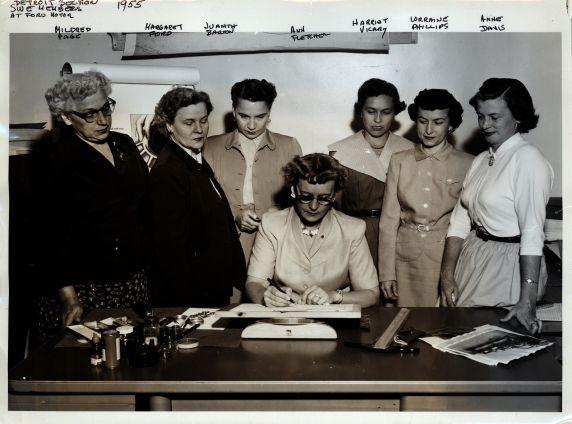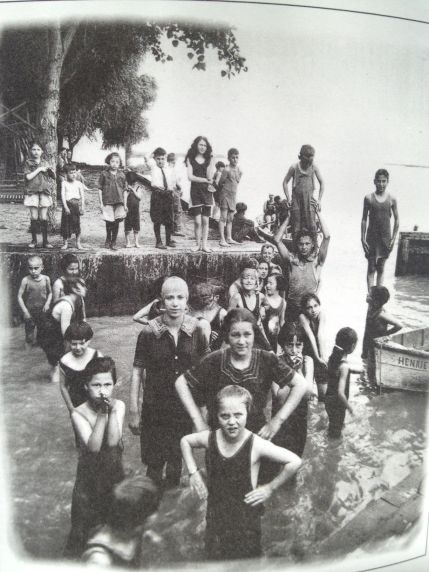Collections Spotlight: “Out of the House: Detroit Women’s Organizations in the 20th Century”
Two archivists from the Reuther presented talks at the Historical Society of Michigan's 57th annual Local History Conference in March. The joint session, entitled “Out of the House: Detroit Women’s Organizations in the 20th Century” was presented by Troy Eller English, the Society of Women Engineers Archivist, and Aimee Ergas, the Reuther's collections archivist for Jewish Detroit. Kathy Schmeling of the Reuther Library was the moderator.
In the first part of the session, Ergas presented some of the history resources of 20th-century women’s organizations from the Leonard N. Simons Jewish Community Archives, which are housed at the Reuther. The Jewish Community Archives (JCA) was established by the Jewish Federation of Metropolitan Detroit in 1991 to preserve the documents of Detroit’s organized Jewish community, including large and small agencies of the Federation. There are over 1,200 linear feet of JCA records, comprised of approximately 25 medium to large collections and more than 20 smaller ones. This includes the Federation collection itself and organizations like the Jewish Home for the Aged, the Jewish Community Relations Council, several synagogue archives, Detroit Jewish Newspapers, and various personal and family collections.
After briefly reviewing some very early women's social service organizations, Ergas highlighted two of the larger JCA collections: The National Council of Jewish Women, Detroit section, and the Sinai Hospital Guild. Both collections document the extensive activities of these women’s organizations, through correspondence, meeting minutes, clippings, publicity and photographs. Smaller organizations were also presented including the League of Jewish Women’s Organizations of Greater Detroit, the Women of Maimonides Medical Society and the Primrose Benevolent Club. These and other JCA collections document how local women built the reputation of Detroit as one of the most active and service-oriented Jewish communities in America.

In her talk, Eller English presented the biographies of four early women engineers from Detroit whose lives are highlighted in the collections of the Society of Women Engineers National Records and SWE Detroit Section Records. Two of the women highlighted attended Wayne University (as WSU was called then) in the 1940s and the contrast between them demonstrates the difficulty some women engineers experienced in the advancement of their careers.
After graduating from Detroit's Cass Technical High School in 1929, Ann O. Fletcher married, raised a son, and taught private music lessons. She changed careers in 1941 after taking an aptitude test at Wayne University to train for war work. She was placed in engineering courses and hired as a patent draftsman for Bendix Aviation. At the conclusion of the Second World War, Fletcher was hired as Ford Motor Company's patent draftsman. Following her retirement from Ford in 1968, she worked as the technical assistant to the chief engineer at Detroit's Shatterproof Glass Corporation for another 10 years. Fletcher served many years as the president of the SWE Detroit section, was the first woman appointed to the State Registration Board of Professional Community Planners, and was the first female fellow of the Engineering Society of Detroit.
Another SWE Detroit Section member, Lucille Pieti, graduated with a mechanical engineering degree in 1950, the same year she was named Miss Wayne University. After briefly working as a technical writer for Ward's Automotive Reports, Pieti was hired by Chrysler to work as both a technical writer and to give public presentations around the country for during Chrysler's New Worlds In Motion Tour, a traveling automotive show. After traveling with the show in 1953, she was sent to California to discuss technical specifications on Plymouth-sponsored commercial breaks during the television sitcom That's My Boy. Pieti returned to her technical writing position at Chrysler when the sitcom was canceled at the end of 1954. She was disappointed by being pigeonholed into technical writing and being a model/spokesperson for the company, however, and left the company and engineering in 1955, choosing instead to marry a childhood friend and raise a family.
The JCA and SWE collections are open and available for public research. To conduct research in these fascinating collections, contact the Reuther Library's reference archivist at reutherreference@wayne.edu.
Troy Eller English is the Society of Women Engineers archivist at the Walter P. Reuther Library of Labor and Urban Affairs. Aimee Ergas is an archives technician at the Walter P. Reuther Library of Labor and Urban Affairs.
- teller's blog
- Login to post comments
- Printer-friendly version


 Reddit
Reddit Facebook
Facebook LinkedIn
LinkedIn